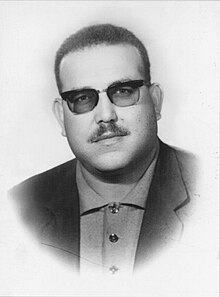Said Al Muzayin (1935 – 29 March 1991) (Arabic: سعيد المزين) was a Palestinian poet who wrote the lyrics of the Palestinian national anthem.[1]
Said Al Muzayin | |
|---|---|
سعيد المزين | |
 | |
| Born | 1935 |
| Died | 29 March 1991 Riyadh, Saudi Arabia |
| Occupation(s) | History teacher, politician, poet |
| Organization | Palestine Liberation Organization |
| Known for | Writing the lyrics for "Fida'i" |
Early life and education
editAl Muyazin was born in 1935 in Ashdod, Mandatory Palestine, where he was also educated.[2] In 1948, after the Nakba, he migrated to the Gaza Strip, which was occupied by Egypt.[2]
Career
editIn Gaza, he operated a printing press, and was arrested by Israelis, before taking part in the early resistance movement in 1956.[2] He later worked as a history teacher, moving in 1957 to Saudi Arabia to teach there.[2] In 1959, he flew to Damascus to work in the Palestinian Liberation Organisation.[2]
From 1973 to 1978, he was representative of the Palestinian National Liberation Movement in Saudi Arabia.[2]
At an unknown date he wrote the lyrics of "Fida'i", a song set to music by the composer Ali Ismael that in 1996 was made the Palestinian National Anthem by the PLO.[3][4]
Selected literary works
edit- "I'm Steadfast", poem, c. 1970[1]
- "Tubas", poem[2]
- "Safar al-Saif", poem[2]
- "فدائية" (Fedayeen), poem[2]
- في خندق الأخلاق (In the Trench of Ethics), book[2]
- Essays on the Revolution, book, Cairo, 1986[2]
- Safar al-Fath, collection of poems[2]
- A People Will Not Die, play[2]
- The House of Our Father, play[2]
- Al-Mawda, play[2]
- "وثيقة الدماء" ("The Document of Blood"), story[2]
- "الدورية 96" ("The Patrol 96")[2]
Death
editAl Muzayin died in Riyadh, Saudi Arabia, on 29 March 1991.[2]
References
edit- ^ a b Bishara, A. (2022). Crossing a Line: Laws, Violence, and Roadblocks to Palestinian Political Expression. United States: Stanford University Press.
- ^ a b c d e f g h i j k l m n o p q r Al-Sahli, Nabil (2022-03-08). "سعيد المزين.. فتى الثورة الفلسطينية وأيقونتها الشعرية" [Saeed Al-Muzayen.. the boy of the Palestinian revolution and its poetic icon]. عربي21 (in Arabic). Retrieved 2022-12-16.
- ^ Palestinian Ministry of Foreign Affairs. "Palestinian National Anthem". Archived from the original on February 5, 2009.
- ^ Kindekens, A. (2020). Akoestische Dominantie En Haar Artistieke Transformatie Door Palestijnse Muzikanten [Acoustic Domination And Its Artistic Transformation By Palestinian Musicians] (PDF). Ghent University (Thesis) (in Dutch). p. 37.